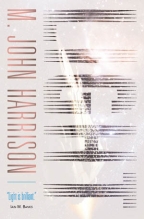Light
M. John Harrison
Victor Gollancz / Orion Books
UK Hardcover First
ISBN 0-57507-026-9
Publication Date: 10-17-2002
336 Pages; £17.99
Date Reviewed: 10-01-02
Reviewed by Rick Kleffel © 2002

REFERENCES
COLUMNS
|
|
|
LightM. John HarrisonVictor Gollancz / Orion BooksUK Hardcover FirstISBN 0-57507-026-9Publication Date: 10-17-2002336 Pages; £17.99Date Reviewed: 10-01-02Reviewed by Rick Kleffel © 2002 |
|
|
REFERENCES |
COLUMNS |
The connection between the utterly personal and the impersonal universe is a natural subject for science fiction writers. Humans are always looking at the sky and seeing not stars, but pictures of other humans. Such liaisons between the individual and the universal tend to be pretentious and lean more heavily in the direction of the universe than the human. It's as if the universe, having more mass, exhibits a correspondingly greater gravitational pull than the puny human. In 'Light', M. John Harrison tilts the balance in the opposite direction, focusing on the intensely personal and finding the intensely universal in the fractally fractured details of his characters' complex lives. For this writer, science fiction is in the details. But that doesn't mean that he's going to neglect the big themes. The next step in human evolution has haunted the genre since Stanley Kubrick confounded the world 34 years ago. Harrison's novel hunts for moments that mark their own future. His vision of the present is as strange and surreal as his vision of the far future. Evolution is slow. Steps may take place 400 years apart, and we've learned a lot in just 34. 'Light' is the text equivalent of '2001' for 2002.
Going against the grain, which seems easy for this author, Harrison drops the reader into the near past. It's 1999 and Michael Kearney is working with Brian Tate on a quantum computer. He's also working on issues with other people and reality itself that even a quantum computer would have a tough time getting round. He never escaped his fantasy life as an adolescent. Pieces of it are literally following him around. One particularly nasty bit calls itself the Shrander, and in order to evade it he does things to other people. Some of the things he does are manipulatively screwy and others are much worse. If he could just come to terms with his overly aggressive fantasy life, he might be able to bring himself to finish work on the quantum computer. 400 years in the future, Seria Mau Genlicher is a "K-tech" ship and perhaps something much more -- human. She's looking for passengers while Chinese Ed experiences hallucinations that are rather reminiscent of those experienced by Kearney. Under the blinding light of the Kefahuchi Tract, somewhere in a Milky Way galaxy transformed by starfaring humans, they're both searching for a transforming technology. It's almost as if they don't realize that they already have one.
Harrison both does and does not make things easy for the reader to understand. On one hand, the passages set in the near-past are perfectly comprehensible at least in setting. But the writing is close, surreal and subjective. It's both disturbing and more than a bit beautiful. The portions of the narrative set in the far future are beautifully simple but Harrison twists the language to create a truly alien environment. Harrison constantly skirts the edge of accessibility, telling the reader just enough to create a fabulously enticing mystery. It's dual in nature. The reader wants desperately to know both what the hell is going on and what the hell is going to happen.
Harrison reveals the workings behind the mystery with much more finesse than a simple curtain pull, though he throws in a few of these for their scenic value. He also rewards the reader by answering the most urgent questions before the reader reaches a peak of frustration. Here's a science fiction novel where the bits that might in other works be dismissed as "info dumps" are refreshing breaths of fresh air and clarity. Harrison paces the novel with revelation as much as he does with plot.
He also sets a few new standards in the process. Once again, the rules of space combat are re-written in a clever and imaginative fashion. Aliens manage to seem alien even in a future where humans have radically changed themselves. Running through all of Harrison's hallucinations and speculation are closely observed veins of actual character development, also used to pace the novel and keep the pages turning. One of the paradoxes of this novel -- and it's just that there should be paradoxes in the novel itself -- is that Harrison's prose style deftly manages to keep his inclination towards difficult writing at arm's length. For some readers, that might be too close. For others, it will cause fixation on this fine writing.
Harrison is smart enough to know what to reveal and what to conceal, and when to perform each action with his effortless prose. 'Light' is a balancing act as much as anything. For this reader Harrison manages to stay on a high wire that leads out to a white dot in the clear blue sky. Paradoxically, 'Light' is not light reading. It requires a degree of attention that is in fact actually rewarded with revelation and insight. It delivers all the staples of great space opera and great science fiction and even, shockingly enough, great fiction. It's a bit of hike to Harrison's summit, but once you get there the view is impeccable.